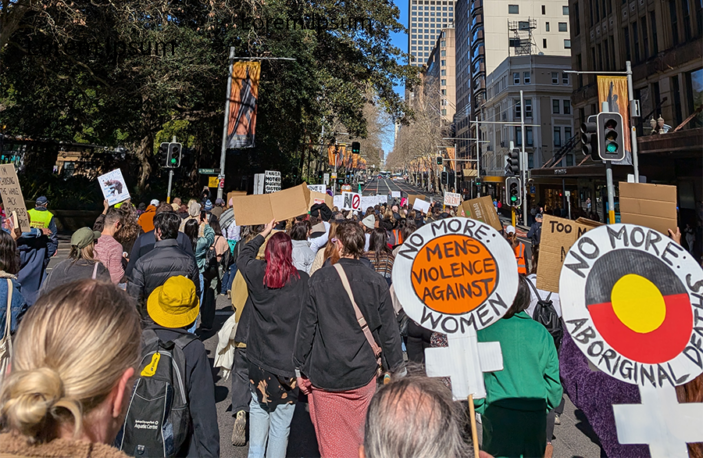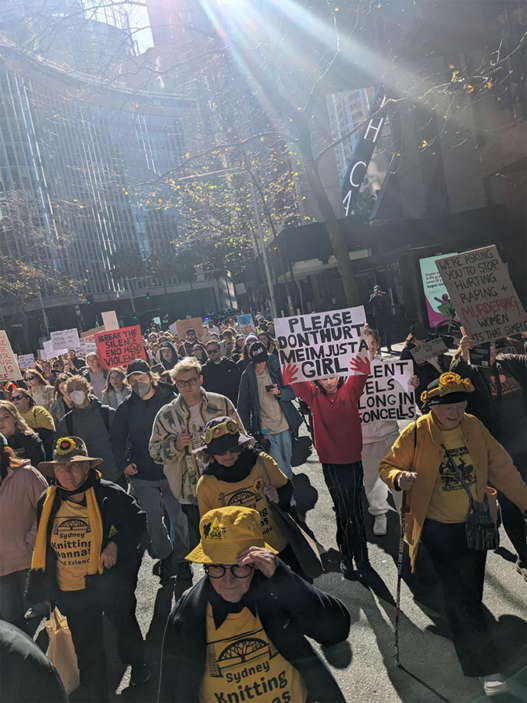
TW: the following article discusses violence against women, including rape and assault.
We are 30 weeks into 2024 and 54 women have lost their lives largely at the hands of men. By the time you read this, that statistic will have increased. On average a woman is being murdered by a man every 3 days in Australia. We are in the grips of a National Emergency, a worldwide pandemic and yet it continues to feel as if we are shouting into a void.
Over the weekend (July 26-28) 27 rallies were held across Australia to combat men’s violence against women. The No More rallies were organised by What Were You Wearing, an Indigenous, youth led, not-for-profit organisation fighting to end sexual violence.
This is the second time this year that rallies have been organised around the country, with the first being held in April, and sadly it won’t be the last. I attended in Sydney. As thousands of women, men and children gathered in Hyde Park, there was a heighten sense of anticipation. This was no doubt exacerbated by the heavy police presence. It was only when I was asked if I was a survivor or an ally that it dawned on me the significant amount of trauma present in that park.
As we marched towards Sydney Town Hall, signs held high, our chants could be heard down the streets of the CBD.
“Say it once, say it again, there’s no excuse for violent men!”
It felt good to be yelling, to be visibly angry, to allow all the frustration and hate force its way out. Yes, I said hate. The one word women so often shy away from when discussing men’s violence. Because every time I hear of another woman being murdered by a man – I feel hate. Every time I listen to another friend recounting an incident in which they were assaulted, attacked or abused – I feel hate. Every time a man has assaulted me – I feel hate.
By the time we reached Town Hall, emotions were running high. The crowd gathered in front of St Andrew’s Cathedral School, a place where 21 year old Lilie James was murdered by Paul Thijssen on the 25 October 2023, and we paid tribute, through the laying of flowers, to the 54 women who have been murdered in Australia since the start of the year.

The first speaker of the day was NSW Greens senator Mehreen Faruqi who spoke about the lack of action from the Labour Government, asking, “How much more anger and grief should we all express? How many more marches and demands for action do we have to make before Government’s across this country decide to step up?” She made a valid point when she stated, “Violence against women is a National Emergency but the Government refuses to fund it like one” Perhaps this is because, according to Prime Minister Anthony Albanese, “society and Australia must do better” when it comes to violence against women – but apparently not the Government.
Author, educator and advocate Ashlee Donohue spoke passionately about how instances of violence against women is disproportionately higher in Aboriginal communities, and not enough is being done to shine a light on this. “We don’t need more proof that violence against women is a thing.”
She spoke about the coward punch laws in NSW, asking, “When’s the last time you heard about a man being killed by a coward hit?” In 2014, 91 people had died in Australia in the previous fourteen years from a coward punch, so new laws were brought in that included a 20 year jail sentence and lock out laws. So 91 men die at the hands of other men over 14 years (on average 7 per year) and laws are changed to prevent it happening again. A woman is murdered every 3 days and nothing has changed. We know the Government can enact swift change when they want to – so why aren’t they?
Donohue also suggested that domestic violence perpetrators should be made to wear a bright pink ankle bracelet so that everyone knows what they did, commenting, “For too long women carry the shame. And we don’t own the shame.”
She is Not Your Rehab is an anti-violence movement founded by Sarah and Matt Brown. It invites men to acknowledge their own childhood trauma and to take responsibility for their healing so that they can transform their pain instead of transmitting it on those around them. Sarah spoke emphatically about how change needs to happen with men and some of the positive changes their organisation has made in New Zealand correctional facilities.
She was direct when she said, “To our men – you’re killing us. And you’re killing yourselves. Please stop saying ‘not all men’ when what we need to hear is you say, with conviction, not any men. Our lives depend on you doing this.” Brown continued, “[We’re] grooming boys to behave in a stoic way because an outdated, westernised model of hyper masculinity is what has become collectively accepted by us all.” This, right here is a major part of the problem. Patriarchy hurts everyone, but it’s killing women.
A point made by Brown which really hit home was, “We have left men’s healing up to the women they are in relationships with.” But it is not our job to fix you. She is not your rehab.
Katia Schwartz is a disability and sex worker rights activist who has worked in the sex industry for 16 years. It was incredible to hear her say (via Auslan and a translator, as she is deaf), “I stand here before you as a proud, deaf whore. Reclaiming a word used against me in violence.” It was shocking to discover how previous partners had weaponised Schwartz disability against her, refusing to learn her language, Auslan, and forbidding her from wearing hearing aids. For sex workers there is a far greater chance that they will experience abuse in a personal relationship than at work.
Recently NDIS Minister Bill Shorten announced his intention to ban sex workers from being accessed using National Disability Insurance Scheme (NDIS) funding. This decision, disability advocates argue, will put the choice of which people with a disability have sex in the hands of the government. With this in mind, Schwartz’s words were even more relevant as she stated, “Today I stand in front of all of you with a simple message: we must address and disassemble systematic discrimination and gendered violence in the forms of ableism and whore-phobia.”
Sarah Rosenberg is Executive Director of With You We Can, a victim-led network demystifying the police and legal processes for victims of sexual violence while working to improve them. She spoke of her own experience with rape and explained why she calls herself a victim of sexual violence, and not a survivor, commenting, “For me ‘survivor’ is a shaming of those who did not survive the crimes committed against them. Their strength did not depend on making it to the finish line of the violence”
She spoke passionately about how, so often, women are told that their suffering is for a reason, that their trauma has made them into who they are. To that, Rosenberg is blunt when she states, “I was not raped for a reason.” She continues, “Devastation can lead to growth, but so often it doesn’t. Ask the 54 women who aren’t standing here with us today.”
Rosenberg concluded with a sentiment felt by so many in the crowd before her. An empowering and important reminder.
“I am sick of preaching to the choir. This crisis concerns all of us. Victims have the courage to put themselves through hell. And they do it for you. For the communities safety. Believe them. Thank them. Uplift their voices. I’m a victim, my grief is not over and I will not shut-up. Neither should you.”
The final speaker of the day was Hala Abdelnour, Founder and CEO of the Institute of Non-Violence, an organisation whose focus is to provide tools for more inclusive and intersectional systemic response to address and prevent the use of violence.
Abdelnour touched on what I believe is one of the biggest contributors to the increase of men’s violence against women – the Manosphere, incels and the online grooming of boys and men. These men gather in online chat groups and discuss their hatred of women and, in some cases, how they would rape and/ or kill them. (Laura Bates discusses this premeditated act of terrorism by men in detail in her book Men Who Hate Women.)
These groups are vast and Abdelnour called upon the eSafety Commissioner and the Government to do better to end misogynistic incels online before they are able to influence young boys and men, commenting, “We don’t doubt that our Governments have the capacity to act fast, to act hard, when they see an issue is important. It just seems that when the victims represent them, or when the persons their targeting to be the violent offenders represent marginalised communities they have no problem acting. But when the victims are women and other marginalised communities, they throw theirs hands up in the air and say we don’t know what to do. Lets have another National Inquiry.”
After what had been an emotional day of talks, full of powerful vulnerability and raw honesty, Abdelnour expressed a sentiment felt by all when she said, “It’s just so absurd that we even have to gather here today and say it’s not ok to rape and murder women.”
Yes, it IS absurd. But it doesn’t seem to matter how loud we yell or how many times we say it, nothing changes. Our words and our actions achieve nothing. But, as Rosenberg said, I will not shut up.
I don’t care if my anger makes you uncomfortable. I don’t care if conversations about men’s violence and abuse of women makes you defensive. If you are not part of the conversation, you are part of the problem.
Every man who stands by as their mates speak disrespectfully about women.
Every man who knows his mate is abusing his partner and says nothing.
Every man who utters the phrase ‘man-up’ to their sons.
Every man who hears women speak about their trauma and responds with ‘not all men’.
You are an accomplice to abuse.
Do better. Be better. And not because you have a sister, a daughter or a wife – but because women are human beings who deserve to live free from fear.
We deserve to feel safe walking alone.
We deserve to feel safe at night.
We deserve to feel safe to have a drink in a bar.
We deserve to feel safe catching an Uber.
We deserve to feel safe on public transport.
We deserve to feel safe at work.
We deserve to feel safe in our own homes.
STOP KILLING US
NO MORE.
Support Resources
Full Stop Australia: 1800 385 578
1800RESPECT: 1800 737 732
13YARN: 13 92 76
Qlife: 1800 184 527
Lifeline: 13 11 14
Sexual Assault Helpline: 1800 010 120
DVConnect Mensline: 1800 600 636
DVConnect Womensline: 1800 811 811
